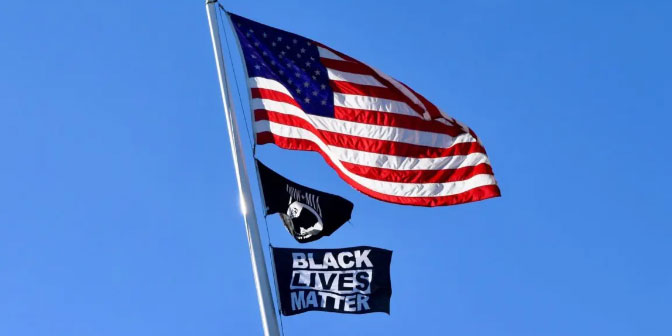
A convenient concept taking progressive politicians by storm.
When I emailed the Barrington Town Council to voice my objection to their promotion of the Black Lives Matter flag in a divisive way and expressed that a flag policy has to be content-neutral, member Jacob Brier wrote back to asserted that it was “government speech.” It was therefore completely constitutional. Many others who received a similar response from Brier shared my “What in the world does that mean?” reaction.
Apparently, it’s becoming a thing nationwide. John Hinderaker, of PowerLine, notes its usage by a school board in Rochester, Minnesota. Rachel Mills reports for the local ABC affiliate out there:
The Rochester Public Schools board voted unanimously Tuesday evening to make several phrases and images, including “Black Lives Matter,” government speech, meaning the school can’t be held liable for allowing those views while not allowing opposing views.
“So here with adopting the messages that you’re adopting as government speech, you’re saying these are the messages that we’re communicating as a school district and by doing that we’re not also creating a forum to allow other types of speech to enter the forum,” John Edison, the RPS board attorney said.
Hinderaker (a lawyer) says the phrase is new to him and that “the idea of declaring an idea to be ‘government speech’ so as to prohibit anything counter to it seems a bit sinister.” The impression that somebody, somewhere is feeding this legal rationale to the most-local of elected officials across the country only makes it more sinister.
That said, the Legal Information Institute (LII) at Cornell Law School does shave a page explaining the “doctrine.” However, it has tended to apply to government actions. If the government’s message is “go get vaccinated,” for example, the First Amendment does not require it also to fund anti-vaccination content.
There can be little doubt, however, that the progressives are pushing this doctrine to apply to something new, explaining why it intuitively seems so wrong. As the LII explains, it doesn’t apply to trademarks for several reasons:
First, the Court noted that, unlike license plates, trademarks do not have a history of use to convey messages by the government. Second, the Court further reasoned that the government does not maintain direct control over the messages conveyed in trademarks—indeed, “[t]he Federal Government does not dream up these marks, and it does not edit marks submitted for registration.” And third, the public, according to the Tam Court, does not closely identify trademarks with the government.
Black Lives Matter is a trademark and an organization. Indeed, one could argue that it violates the rights of BLM for the government to declare its name to be the government’s own speech. Noting these facts brings us back to the basic impression that “government speech” is simply an excuse for government to give preference to specific groups and ideologies, and we should expect to see this deployed more and more frequently to restrict the free speech rights of non-progressives.
When governments approve quasi-permanent statues, they tend to seek broad consensus, not in-your-face ideological statements. Unfortunately, to progressives, nobody else has any right to be represented.
Featured image of Barrington’s BLM flag via UpRise RI.

